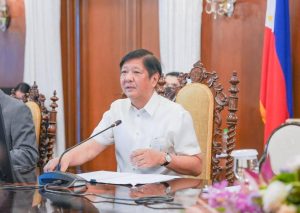An apparent rift among allies of Philippine President Ferdinand “Bongbong” Marcos Jr. could undermine his “unity” government barely a year after being sworn into power.
First, former President Gloria Macapagal-Arroyo was demoted from her role as senior deputy speaker of the House of Representatives after she was suspected of leading a coup against the Congress leadership. She denied this and rejected the “needless politicking” that distracted the work of legislators. Arroyo supported the candidacy of Marcos and was even called the government’s “secret weapon” during the president’s foreign trips.
But Speaker Ferdinand Martin Romualdez, the first cousin of President Marcos, confirmed the attempt to “destabilize” the House leadership without naming anyone in the plot.
“There is still much work to do, so occasional moves to destabilize the House should be nipped in the bud,” he said in a press statement, while assuring the public that Congress will continue to focus on passing the priority measures of the president. Perhaps Romualdez acted fast because Arroyo led a successful House coup and became Speaker in 2018.
After this, Vice President Sara Duterte announced her resignation as a member and chairperson of Lakas-Christian Muslim Democrats, the biggest party in Congress, whose members include Romualdez and Arroyo. Duterte is known to have close ties with Arroyo. In her official statement, Duterte said that her mandate to lead “cannot be poisoned by political toxicity or undermined by execrable political powerplay.”
Duterte later wrote a cryptic message on her Instagram page about an ambitious “tambaloslos.” The loose English translation is “in your ambition, do not be thick-faced.” But “tambaloslos” is also a male mythical creature in local folklore with a large mouth and genitals who has the power to confuse people. Social media was abuzz about the male creature she was referring to in her post.
Another significant update was the registration of a new political party, Kilusan ng Nagkakaisang Pilipino (Movement of United Filipinos), whose petitioners include prominent allies of the president. The officers of the new party even hinted that it could become the new dominant party since it has a powerful backer.
Ironically, these realignments took place during the week when supporters of the administration were supposed to mark the first year after the Marcos-Duterte tandem was declared the winner in the 2022 election. It is unlikely that this could affect the last session week of Congress but the fallout may delay the rollout of the president’s legislative agenda this year. Opposition forces can also highlight how politicians are already maneuvering for power and influence ahead of the 2028 elections at a time when ordinary Filipinos are still reeling from surging inflation and economic insecurity.
More significantly, the statements and actions of Marcos allies reflect the state of party politics and electoral democracy in the Philippines.
To prove that she is not involved in any plan to challenge the House leadership, Arroyo insisted that “no coup can ever succeed without the consent of the President” and that the House leadership “has traditionally been closely associated with the sitting President.” She added that “the check and balance needed in any democracy has traditionally been well-provided by the Senate.” She actually confirmed what analysts have been explaining about the House of Representatives being the rubber stamp of the president and its failure to uphold the Constitutional mandate of being an independent branch of the government.
That Duterte is still considered the leading presidential candidate in 2028 despite having no political party to back her candidacy reflects the weak party system and the continuing dominance of political families in electoral politics. Marcos remains the president even if his own party, Partido Federal ng Pilipinas, only has two members in Congress. Politicians can switch party affiliations or establish new parties as a matter of fulfilling electoral requirements instead of being guided by a set of political doctrines or principles.
Congress will adjourn this week but the battle for political supremacy will continue. The second State of the Nation address of Marcos in July will likely reveal which power blocs emerged stronger and weaker as politicians scramble for position ahead of the midterm election in 2025 and the presidential election in 2028.
































